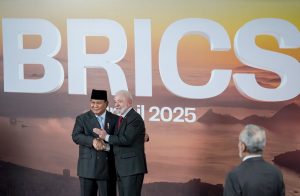On July 6, Indonesian President Prabowo Subianto attended the BRICS Summit in Rio de Janeiro, Brazil. President Luiz Inácio Lula da Silva welcomed him during his opening speech and congratulated Indonesia on becoming a full member of the organization as of January 2025. Lula emphasized the significance of the summit by referring to BRICS as the heir to the Bandung Conference.
In 1955, Indonesia hosted the Asian-African Conference in Bandung to promote independence and solidarity among 29 mostly newly independent and developing countries. Lula asserted that BRICS carries the “Bandung Spirit” in its quest for a multipolar international order, especially amidst the ongoing collapse of multilateralism, which threatens the autonomy of developing countries as well as international climate commitments and fair trade.
Furthermore, as the United States prepares to issue tariff letters to several countries, Prabowo’s presence at the BRICS Summit signified Indonesia’s aim to strengthen solidarity among the Global South in response to the United States’ unilateral tariff measures. On April 2, President Donald Trump announced steep hikes in tariff rates for U.S. trading partners, including a 32 percent tariff on imports from Indonesia.
In 2024, the U.S. was one of Indonesia’s top trading partners, and Jakarta had a $16.8 billion trade surplus with Washington. Conversely, the U.S. faced a $17.9 billion deficit with Indonesia, making Indonesia the 15th-largest contributor to the U.S. trade imbalance.
Trump soon after paused the looming tariffs for 90 days, a measure initially set to expire on July 9; with some administration officials stating in early July that the deadline had been pushed back to August 1.
Indonesia, like many other states, attempted to pursue a better deal with the Trump administration, in part by agreeing to a trade pact worth $52.3 billion, which entails an increase in imports of U.S. fuels and investments in the U.S. energy and agricultural sectors, as stated by Chief Economic Minister Airlangga Hartarto.
However, it remains uncertain if the negotiations will yield results, as Trump recently stated that he intended to send a “take it or leave it” letter instead of engaging in “complicated” negotiations.
Indonesia’s concern regarding Trump’s unilateral tariffs aligns with the views of BRICS, which believe these actions could harm the global economy and undermine the authority and rules of the World Trade Organization (WTO). The Rio de Janeiro Declaration calls for reforming the WTO, stating it is the only multilateral institution with the necessary mandate, expertise, universal reach, and capacity to lead discussions on international trade, including the negotiation of new trade rules. The declaration also advocates for reforming the Bretton Woods institutions to better reflect the growing influence of developing countries in the global economy. By doing so, BRICS positions itself as a platform for multilateralism and a driving force for global governance reform — an initiative that Indonesia is eager to support.
Unfortunately, Trump appears suspicious of BRICS. He has threatened to impose an additional 10 percent tariff on any country that aligns itself with what he considers the “Anti-American policies” of BRICS. The aspirations of BRICS, such as global governance reform and financing in local currencies, are viewed as challenges to American hegemony.
Indonesia recognizes the fierce rivalry among major powers and the desire of developing countries for autonomy. In many international fora, Prabowo continues to uphold Indonesia’s long-standing policy of an independent and active foreign approach. Amid concerns from scholars about Indonesia leaning toward China, Jakarta understands the importance of maintaining cooperation with both China and the United States. No major power should be excluded from development efforts. Often, Jakarta aims to foster inclusivity in the region. At the 34th ASEAN Summit in 2019, Indonesia steered the ASEAN Outlook on the Indo-Pacific (AOIP), promoting a regional norm that welcomes contributions from any major power as opposed to the polar opposites of “Asia for Asians” or concerted effort to encircle China. Indonesia has also actively sought U.S. involvement in developing its nickel industry, which is perceived to be largely influenced by China. Unfortunately, the U.S. has not seized this opportunity, leaving Indonesia with fewer options. Nevertheless, Indonesia remains steadfast in maintaining its impartial stance.
During the BRICS Summit in Rio de Janeiro, Prabowo proposed that Indonesia act as a bridge builder between the Global South and the Global North. This strategy is designed to reduce tensions between developing and developed nations, as Indonesia aims to prevent BRICS from becoming an opposing force that further deepens the divide between these two groups of countries.
A recent study published in Foreign Affairs Magazine showed that Indonesia is one of the most effective hedgers among the ASEAN countries. It received a score of 49 on the Anatomy of Choice Alignment Index, where a score of zero indicates complete alignment with China, and a score of 100 signifies full alignment with the United States. The index highlights Jakarta’s diplomatic success in maintaining a balance among superpowers, lending credibility to Indonesia’s envisioned role as a bridge builder.
Indonesia is not sleepwalking into strategic alignment with China. Prabowo’s proposal to act as a mediator should be seriously considered to ensure that BRICS contributes to a multipolar order.

































